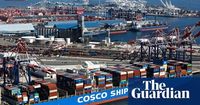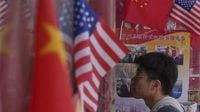In a significant escalation of the ongoing trade war, China announced on Friday, April 4, 2025, that it will impose a 34% tariff on all imports from the United States, effective April 10, 2025. This retaliatory measure comes just two days after President Donald Trump announced a matching 34% tariff on all Chinese goods as part of a broader strategy to address trade imbalances with various countries.
The Chinese Ministry of Finance stated, "For all imported goods originating from the U.S., an additional tariff of 34% on top of the current applicable tariff rate will be imposed." This latest move marks a dramatic increase in tensions between the two largest economies in the world, with the total U.S. tariff on some Chinese goods now exceeding 54% when combined with previous tariffs imposed by the Trump administration.
China's decision to escalate tariffs was accompanied by additional measures, including the suspension of imports of chicken products from three U.S. companies and sorghum from C&D (USA) Inc., citing health concerns. The Chinese Commerce Ministry has also filed a lawsuit with the World Trade Organization (WTO) in response to the new U.S. tariffs, arguing that they violate international trade rules.
China's State Council Tariff Commission condemned the U.S. tariffs, labeling them as "a typical act of unilateral bullying" that "seriously undermines China’s legitimate rights and interests." The commission urged the U.S. to cancel its tariff measures and resolve trade disputes through respectful consultations.
As the trade war intensifies, the economic implications are beginning to take a toll on global markets. Following China's announcement, stock markets around the world saw significant declines. The FTSE 100 in London dropped over 300 points, marking its largest one-day decline since March 2023, while the Stoxx 600 index of Europe’s largest companies fell by 4.4%. In the U.S., stock futures also pointed to further losses, with the Dow Jones Industrial Average and the S&P 500 set to open sharply lower.
Investment bank JP Morgan has raised its forecast for the likelihood of a global recession, now estimating a 60% chance of economic downturn by the end of the year, up from 40% previously. The escalating trade war is raising concerns about its potential impact on inflation and economic growth, with analysts warning that the situation could worsen if further retaliatory measures are enacted.
In addition to the tariffs, China has added 11 U.S. companies to its "unreliable entities" list, which prohibits them from importing or exporting to China. Moreover, the Chinese government has imposed export controls on 16 firms and initiated an anti-dumping investigation into medical X-ray tubes imported from the U.S. and India.
China also announced new restrictions on the export of seven rare earth minerals, including samarium and gadolinium, which are essential for high-tech manufacturing, such as batteries and electric vehicles. These measures are designed to exert pressure on the U.S. and highlight the interconnectedness of global supply chains.
The trade war has also raised concerns in other countries. Vietnam expressed regret over the U.S. decision to impose a reciprocal tariff of 46% on its exports, emphasizing that such actions do not reflect the spirit of mutually beneficial economic cooperation. The Vietnamese government is actively seeking discussions with the U.S. to find practical solutions to mitigate the impact of these tariffs.
Meanwhile, the economic fallout from the tariffs is being felt across various sectors. Madagascar's export-dependent economy faces a 47% tariff under the new U.S. measures, jeopardizing its vital vanilla and textile industries, which heavily rely on exports to the U.S.
In response to the unfolding situation, Taiwan's President Lai Ching-te stated that his government would provide support to industries affected by the new tariffs, acknowledging the potential adverse effects on the global economy.
As the trade war continues to escalate, both the U.S. and China appear to be at an impasse, with neither side willing to back down. Trump's administration maintains that the tariffs are necessary to protect American jobs and address unfair trade practices, while critics argue that the tariffs could lead to higher prices for consumers and increased economic instability.
In a social media post, Trump remarked, "CHINA PLAYED IT WRONG, THEY PANICKED – THE ONE THING THEY CANNOT AFFORD TO DO!" This sentiment underscores the high stakes involved as both nations navigate the complexities of international trade relations.
Looking ahead, analysts suggest that the escalating tariffs could lead to a prolonged period of uncertainty in the global economy. The potential for further retaliatory measures looms large, as both sides continue to assert their positions in a high-stakes game that could reshape global trade dynamics.
As the situation develops, businesses and consumers alike are bracing for the potential consequences of the ongoing trade war, with many hoping for a resolution that prioritizes cooperation over confrontation.







